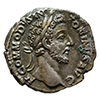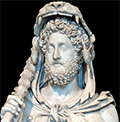The Roman Emperor Commodus
Commodus was a Roman emperor in the late 2nd Century. He was notorious for his excesses and died without an heir, triggering a succession crisis. 
He was born on Aug. 31, 161, in Lanuvium, near Rome. His father was Marcus Aurelius, who at the time of the boy's birth was Co-emperor of Rome. Commodus was the only son of his parents' 14 children to survive infancy. As a child in the imperial family, he enjoyed a good-quality education. He did not share his father's penchant for study or work and seemed interested only in living life to excess. Father and son went to war with a handful of German tribes in the 170s. On a later tour of Athens, they shared initiation into the Eleusinian Mysteries. In 177, Commodus won the twin responsibilities of serving as consul (the youngest ever) and later serving as co-emperor. He and his father shared power for the last three years of the latter's life. During this time, Commodus also got married, to Bruttia Crispina; they had no children. Marcus Aurelius died on campaign, and Commodus quickly moved to negotiate a peace agreement with the German tribes that Rome had been fighting. He returned to Rome on Oct. 22, 180, and celebrated a triumph. All of 18, he had little interest in the running of the government, leaving such mundane matters to his advisors. What he really enjoyed was the thrill of the games. He ordered many such spectacles and particularly enjoyed watching gladiatorial contests. He even took part in a few, always managing to win. He spent large sums of money on these public entertainments. That, coupled with his seeming weakness because he was willing to cede his responsibilities to others, made him a target for conspiracies. His own sister, Lucilla, joined in one such plot in 182, along with a number of Senators. The plot failed, and Commodus had the plotters executed. After this brush with death, Commodus tasked Tigidius Perennis, a commander of the Praetorian Guard, with protecting him. The emperor rarely appeared in public after that, issuing pronouncements through Perennis. In time, the emperor-in-appearance began to think of himself as emperor material in fact. Perennis made an enemy of Cleander, a former member of the royal household, who discovered Perennis's intention to displace Commodus and warned the emperor in time. As before, Commodus had the plotters executed and rewarded his savior with a position of power. Cleander brought in large sums of money to the royal treasury by selling governorships and Senate seats. He, too, saw his downfall at the hands of the emperor, who blamed him for perpetrating a food shortage and ordered him executed. 
Finally, in 190, Commodus announced that he would be serving as the emperor in fact. He presented himself as a reincarnation of the famous hero Hercules. Wearing a cloak made from a lion's hide, he demanded that the Senate declare him a living god and refer to him not as Commodus but as Hercules. He followed that up with orders to construct statues of himself in various places around Rome. He renamed the months of the year and took advantage of a large-scale fire in 191 to remake Rome the way he wanted it to look. Then, he changed the name of the city to Colonia Commodiana ("Colony of Commodus"). In that same year, he ordered his wife executed. As well, significantly, Commodus ordered the currency devalued, literally specifying that gold coins contain less gold and silver coins contain less silver. Quite literally, each coin was worth less money than it had been before. This not only resulted in less income for the royal treasury but also brought about economic upheaval, at a time when Rome could least afford it. For the New Year's Day 193 festivities, Commodus announced his intention to fight again in the arena. He never made it. The night before, his new favorite woman, Marcia, tried to poison him. The seemingly indestructible Commodus didn't look to be dying from ingesting the poison, so Marcia went with the backup plan, which was to have Narcissus, a professional wrestler, choke Commodus to death. He had not named a successor and had no children; this led to a succession crisis, resulting in the Year of the Five Emperors. |
|
Social Studies for Kids
copyright 2002–2026
David White




